Ours Alone!
Ground-Breaking Acting Method That Allows You To Get Lost In The World Of The Character, So You Can Emotionally And Physically Express Yourself Without Thinking About How To Do It.
Dear Friend,
Method Acting is known for producing 100% authentic, real, convincing acting. No faking, forcing, or pretending, just pure authenticity.
It first became famous in the 1950s when Marlon Brando, James Dean and Paul Newman revolutionised film acting with their outstanding method performances. This has continued to this day with the likes of Bradley Cooper, Leonardo DiCaprio, Robert De Niro, Al Pacino, Angelina Jolie, Scarlett Johansson and Lady Gaga, to name a few.
I was first introduced to Method Acting inadvertently by my dad. One day, when I was a kid, he brought home a copy of The Godfather. I was mesmerised by how subtle and real the performances were. I remember Brando, toying with a cat gently as he arranged brutal beatings for his friend’s enemies and how Al Pacino created sheer panic in his eyes as he got ready to shot a gangster in a restaurant. I was hooked. Their acting was so real you forgot they were acting. You believed their characters completely.
This, in part, was the inspiration for my life long journey and dedication to the mastery of Method Acting. I’ve never been interested in acting that was just pretending, it never engaged me. I have always pursued the route that creates the most authenticity and freedom of expression for the actor.
The man responsible for the creation of modern Method Acting, in the 1950s, was Lee Strasberg. Lee created a new way of training actors that allowed them to generate an extremely high level of authenticity in their work consistently. Before Lee taught acting, he was trained by a Russian chap called Richard Boleslawski in the art of acting. Richard had been part of the pioneering group of actors in Russia called the Moscow Arts Theatre, before moving to the US where he meets Lee.
Method Acting actually began back in the early 1900s in Russia, with a chap called Konstantin Stanislavski. He was the first person to create a system to train actors in how to be totally authentic and naturalistic. He is, without doubt, the originator of the first method type work. He wrote a book that he spent all his life writing called An Actor Prepares. He was still completing it on his death bed. Pretty much every drama student these days gets told to get that book because it’s believed to be the acting bible. But before you rush out to buy it, you should know that there were lots of problems with the Stanislavski System that even he acknowledged.
It was mainly because of two other men – Eugene Vakhtangov and Nikolai Demidov – that the flaws were identified. They were both teachers for Stanislavski. Many don’t realise that Stanislavski himself, didn’t teach the technique much, if at all. Other teachers did that for him. The issues with the system didn’t go unchecked, and Demidov and Vakhtangov started to change and alter the approach to make it more free, creative and organic. In the end, their organic methods had little in common with Stanislavski’s System.
Vakhtangov was Richard Boleslawski’s teacher, who in turn became a teacher to Lee Strasberg. This is a very important through-line that became crucial in the creation of my own method approach.
The Best Theatre Production I Have Ever Seen
Back in 2012, I went to see a Russian play that was so arresting that it transformed my understanding of acting. I don’t say that lightly as I have spent the best part of thirty years in the acting industry. In the same way, as The Godfather introduced me to The Method as a kid, seeing this play introduced me to another method world that came before Lee Strasberg’s work.
The play was Uncle Vanya performed by the Vakhtangov Theatre Company, who are based in Moscow but were visiting London. Chekhov plays in Britain tend to be delivered like exerts from Downton Abbey, but this Russian company did something entirely different, quite extraordinary and simply dazzling. I had NEVER experienced anything like it before. The level and range of expression was off the chart.
My wife Natalie came to the play with me, and we both left the theatre shell-shocked. We couldn’t take our eyes off the stage; it was mesmerising. It was artistic genius. From that day, I started in-depth research into The Vakhtangov Theatre Company and the man who created it Eugene Vakthangov.
I had heard of Vakhtangov before. Lee Strasberg often sited him as a significant influence on him and the creation of Method Acting, and after seeing the play, I understood why. Vakhtangov’s work is a bit like Method Acting on steroids. The length and depth of authentic personal expression that the actors could access was staggering. A modern-day film reference point could be the work of Daniel Day-Lewis in Gangs Of New York or Joaquin Phoenix in Joker. It’s deep, subtle, extreme and highly expressive work. It’s the kind of work that every actor dreams of achieving. It takes you to a higher plain, beyond the story, it’s almost a spiritual experience you have watching it. Again I was hooked.
Suppression Of Secret Acting Discoveries
I started to research and study the techniques used by Vakhtangov, which also led me to the work of Demidov. At the time, I wondered why I hadn’t heard more about their work. It turned out that the Russian government at the time suppressed a lot of their work. The reason being Stanislavski was a world-renowned acting teacher, and they didn’t want anyone contradicting him. So Demidov’s books were never printed in the west until 2010 and Vakhtangov never wrote a book, but did leave behind diary entries, rehearsal notes and notes taken by his students and first-hand accounts. Again, it wasn’t until recently that this documentation was amalgamated and made available to the west.
It turns out that within this material, there are unbelievable brilliant tools and techniques, that allow the actor to completely immerse themselves in character and work out of the unconscious. Another reason for the suppression was that some of this material was ahead of its time. Back in the early 1900s, no one really knew what the unconscious was, and saying that you were working with, it probably seemed a bit like black magic at that time. In fact, some of the acting discoveries they made never made it to into print because they were afraid of being labelled as ‘weird’ or even worse killed for their views. It did happen back then. Vsevolod Meyerhold, the great Russian theatre director who was around at this time, was sentenced to death by firing squad and his wife stabbed to death, as a consequence of his radical theatre views.
Eight Years Of Deep And Intensive Research And Development
I have to admit to being incredibly excited when I came into contact with this new material. It was like I was given the keys to this secret Method Kingdom.
I spent many years pouring over every book that described Demidov and Vakhtangov’s work. I read and re-read them until they were second nature to me. I then created practical experiments with my students and spent years observing, tweaking and improving them. Soon a new method way of working began to emerge.
It got to a point where I had to test the work in a live performance. I got together with three students who had been working closely with me in the development of the approach, to perform a production of Strindberg’s, Miss Julie. This was a huge turning point. It allowed me and the actors to adjust and fine-tune the work we had done to date. A synthesis of these Russian Grand Masters, Lee Strasberg and my own creations took place.
The production was extremely well received, and the performances were exactly what I was looking to achieve. Deep, subtle, emotional, intense, explosive, expressive and free.
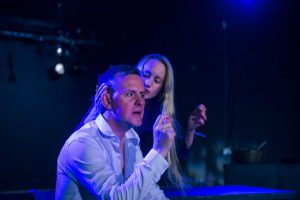
A scene from my production of Miss Julie
I could have stopped at this point, but something in me said that there was more work to be done. More years of research, more experimentation, more development and practical application followed.
I decided as part of my research to go where it all began, Moscow. I attended workshops delivered in Russian (with an interpreter present), talked to Russian acting professors, Master Teachers, watched Vakhtangov Theatre Company productions and spoke with their actors. I went very deep into the work.
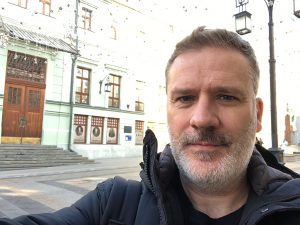
Brian at The Moscow Arts Theatre where The Method began
Some of the workshops took place in Stanislavski’s rehearsal room where he, Vakhtangov and Demidov no doubt, would have worked. Stanislavski’s chair sat in the corner, empty, but his presence felt. I was also working with Russian actors, which was interesting because now I understand where The Method got its reputation for being relentless in the pursuit of truth. The Russian’s are hardcore actors. Any egos are checked at the door, and the dedicated, microscopic work begins. Their work ethic makes many a western actor look like an amateur, in both philosophy and effort. Their results are profound, spiritual and insightful. It’s never just about telling the story for them; they are aiming for deep communion with themselves and the audience.
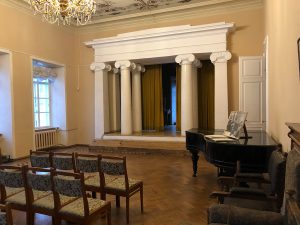
The room Stanislavski, Vakhtangov and Demidov rehearsed in
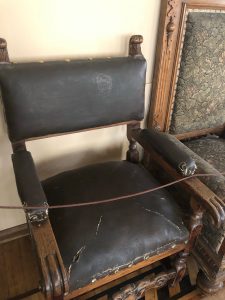
Stanislavski’s chair
My Big Dilemma
After eight years of painstaking research and development, I arrived at a considerable dilemma. Most of my adult life has been dedicated to Lee Strasberg’s Method. I have been it’s most prominent advocate in the UK for decades. I’ve told anyone who would listen during that time that they should study The Method. I’ve taught it to hundreds of students. I’ve even appeared on the BBC discussing it, and it’s importance. My reputation, my identity, my soul have been wrapped up in Strasberg’s Method most of my adult life.
So when I started this journey into the work of The Russian Grand Masters, I was conflicted for a long time. I knew that it could mean me changing my approach…but how could I? I had staked my reputation, my entire acting studio on the work of Lee Strasberg’s Method.
That’s why at first I conducted my research in private. Only a select number of students knew about it, and they joined me on this explorative journey. As things progressed, the work grew to new levels. Suddenly, I realised I could get actors to extraordinary new depths of feeling and expression more easily using this new approach.
I kept this private for some time. The conflict was intense within me. If I introduced this new material, I would need to explain the changes and augmentations somehow. I knew there may be people who would say that I was a hypocrite. How could I sing the praises of Strasberg only to try and change it?
In the end, I just couldn’t live with myself. I couldn’t put my head on the pillow at night knowing I could make people better actors, quicker and easier and not tell them about it. Plus (and this is a big plus) the work of Vakhtangov, Demidov and Strasberg are all related. It’s a through-line of the same ethos and desire to touch and move an audience at the deepest levels using the actors’ psyche.
In Strasberg’s book A Dream of Passion, he states, “The continuation and consolidation of Stanislavski’s and Vakhtangov’s discoveries became the basis of the Method.”
In fact, Strasberg hinged the entire approach to The Method on one of Vakhtangov’s critical differences from Stanislavski’s work which was this:
“What would motivate me, the actor, to behave in the way the character does?” rather than the more Stanislavskian question “Given the particular circumstances of the play, how would I behave, what would I do, how would I feel, how would I react?”
I’m sure had he known about Demidov’s work (remember suppressed by the Russian government at the time and only released in the west in 2010) he would have been studying and incorporating that too. In a way, Demidov’s work is even more distilled and radical.
So, in the end, I felt this was all connected, and while Vakhtangov and Demidov are not Strasberg, they are all strongly related. They are The Method family. I genuinely believe that if Strasberg had the detailed information we now have about these two, he would be EVOLVING his approach, and that is precisely what I am doing here.
The Timoney Method® Acting Cycle
Timoney Method incorporates the work of Vakhtangov, Demidov, Strasberg, Jacques Lecoq (psychological mask practioner) and my own work, making it the ultimate Method Acting approach. You could say that it is more method than Method.
The aim of the technique is for you to be able to deliver “confessionally sincere” acting with unrestricted authentic expression. It allows you to remove your social mask and reveal your creative individuality.
It’s important to understand as an actor that certain essential activities need to occur for high-quality acting to occur.
Over the years, I have distilled my process to a cycle.
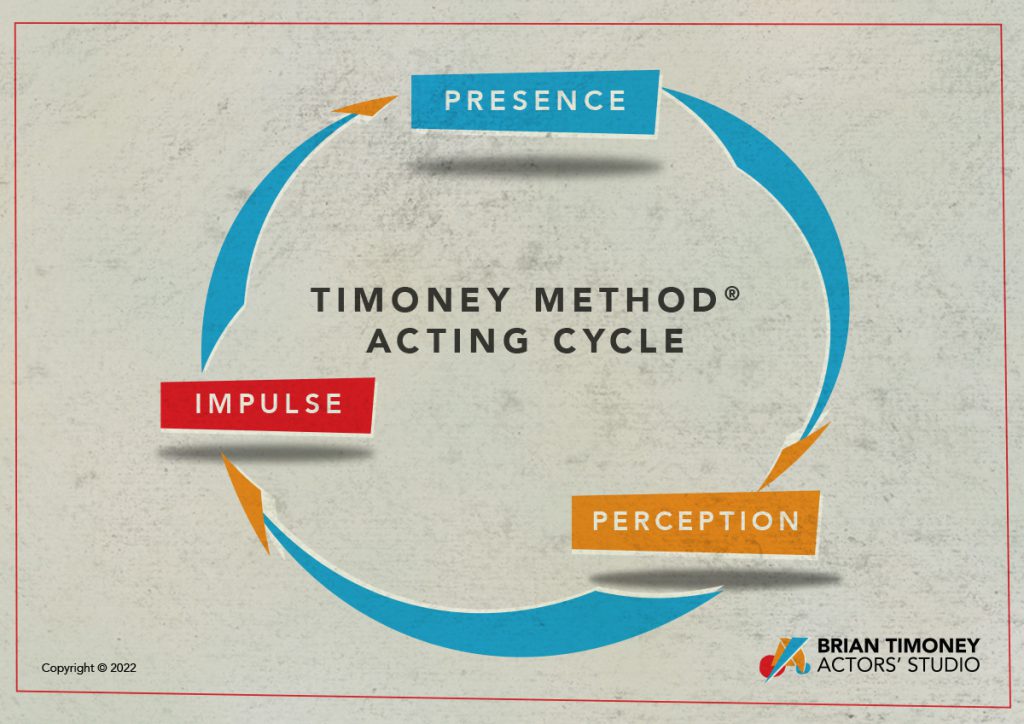
The first activity is achieving presence.
If the actor is thinking about themselves and their needs and wants, they are not present. It’s very easy for this to happen as the actor is often under a lot of pressure when performing. They may be performing in front of a large audience and start to think about how the audience will receive their work. Or even worse, a critic could be in who gave them a bad review in the past, and they start to dwell on that.
I remember Al Pacino being interviewed once about his experience on The Godfather, which wasn’t a good one for him. The film studio didn’t want him to play the role, but the director did and fought for him to be in the film. When they started filming, there were people on set who were against him being cast and would literally snigger at the end of takes. This was hurtful and a potential distraction, but because Al is a well-trained method actor, he had the tools and techniques to overcome this and keep in the moment.
So, you see, it could be easy for the actor to become overwhelmed and lose all presence.
You may have heard the term stage presence; often, this is seen as some God-given talent when, in fact, it’s a learnable skill.
The next stage is perception.
When an actor successfully enters into a character’s thoughts, they begin to perceive everything around them as the character would. They use their own sensory capabilities to see, hear, touch, smell and taste, which are then fused with imaginary perception.
It’s important that the actor can completely immerse themself in the character so that they can perceive everything and anything as the character, not just the lines they have to say. We know, as human beings, we are constantly thinking, not just when we are in a situation where we have to speak. This ability to perceive accurately is key to entering the character’s mind and justifying their behaviours.
The final stage is impluse. We often think that physical action is an impulse which it is, but so is speaking. The desire to say something is also an impluse. The actor sometimes forgets this because they have a script and think they should get on with it and say the lines. But this never happens in real life; there is no script in real life, so we speak when we have thought.
More:
The physical impulse to do something is based upon having a psychological thought. If there is no real thought, the action will be inauthentic. So it’s key that the actor understands how impulses arise and can take them.
This cycle is something that I work on with my students. Each part of the cycle is an essential skill that must be executed repeatedly until it becomes second nature.
Here is a snapshot of what you would learn with my approach:
Confessionally Sincere Acting – through the use of what we call -Études – you will develop an ability to completely immerse yourself into the character and live authentically in their given circumstances. The acting will be so real it will have the quality of someone who holds nothing back and reveals their inner soul to the audience.
The Free Flowing Of Mind, Body And Emotions – through the use of what we call – plastiques – you will develop the ability to let your mind, body and emotions flow like a fast-flowing river, cascading downhill. One of the things that can hold an actor back, more than anything, is the unconscious restriction of their mind, body or emotions. Often when someone becomes tense, they start to seize up and hold back. This can often lead to wooden and dead acting. You will be taught how to enter into a flow state and allow your whole being express itself freely.
Enter Into Spiritual Naturalism – being natural is not enough to create outstanding acting. To be a great actor, you need to be able to communicate deeply with your psyche and express yourself from that place. This goes beyond looking natural and becomes an expression of your artistic soul. This means that both you, the actor, and the audience will have a deep, some say, spiritual experience. The Timoney Method, with its specialised tools and techniques, will allow you to do exactly that.
Create A Fantastic Realism – when an actor can express themselves in the extreme and make it look 100% authentic, they are entering into a form of Fantastic Realism. You will learn through the use of what we call – grotesque, symbolism and archetype how to take things to the limit and create a beautiful artistic chaos that will stop traffic.
Developing The Eyes Of The Character – often actors will try and play characters rather than become them. They don’t even realise that they are doing this as it’s unconscious. By using our Character Box exercise, you will learn how to completely and utterly immerse yourself in character, to the point where you see everything through their eyes.
Unrestricted Expression – a great actor can go with their impulses and express themselves without fear. You will learn how to identify real impulses, large and small, happening in your body as a sensation and then follow through on them. This will allow you to be completely unrestricted in your ability to express yourself.
Emotion On Demand – a character can only exist through you, so it makes sense that there will be times when you need to use your life experience, to create an emotional charge for a scene or character. We do this by the use of sense and emotional memory, collectively referred to as Affective Memory. You will learn how to relive life experiences, through the senses, to create emotion on demand.
Forgetting Yourself And Living Unconscious On Stage Or Set – the ultimate goal that every actor worth their salt strives for, is being able to forget themselves and to live unconsciously in their work. The combination of tools and techniques used within my approach allows you to connect and work with the unconscious and let it take over. It’s taken me decades to identify how to make this happen at will. The result is a complete immersion in the role and their circumstances.
Human Alchemy – This a concept I have worked on for decades. It allows you to mix two opposing qualities to create a third. For example, you mix the intellectual with the sensual, the real with the unreal, rational and irrational, pleasure and pain, good and evil, life and death. When you do this a third quality emerges that is not either of the original attributes. This is chaotic and disturbing to the human psyche, and an audience watching this occur, has a deep and profound experience as a result. It’s not as simple as pretending to be two qualities, this would look amateur, you must go through an unconscious process to arrive at the alchemy authentically which I will teach you.
Enhanced Perception – the ability to understand and identify our perceptions is key to creating ‘in the moment’ spontaneous, organic acting. Otherwise, acting merely becomes an exercise in repetition of scenes and characters trying to imitate what you have done before. With our enhanced perception techniques, you will increase your real and imaginative perceptions, allowing you to create real thought in your performances that change every time.
Soul Print – everyone has their own unique personal atmosphere. This is like a fingerprint for the soul. Using our approaches, you will be able to create your unique soul print for your characters and generate their particular atmosphere within your performance.
Destroy Everything – the brilliant actress of the early 1900s, Eleanora Duse, who influenced the great Method Masters, always advised to destroy everything. What she meant by this was that once a character, scene or entire play has been created once, you must forget it, destroy everything that has gone before and re-experience it for the first time again. You will learn how to do this at will, to ensure, spontaneous, organic, alive acting.
The results I have been achieving from this way of working have been nothing short of amazing.
If you want to learn this and start your acting career, then you can check out my acting courses here:
Timoney Method Intensive – Online intensive.
Ultimate Acting Programme – A One Year Comprehensive (Part-Time) Actor Training Using Timoney Method PLUS A Career Launch

